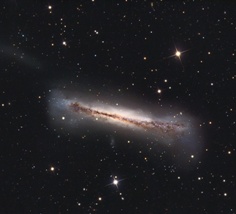Does the universe seem dim to you? - May 16, 2008
 The
universe is twice as bright as previously thought, as dust has been
dimming our view. This could herald a bout of revisionism in some parts
of astronomy.
The
universe is twice as bright as previously thought, as dust has been
dimming our view. This could herald a bout of revisionism in some parts
of astronomy.
Although it has been previously known that dust blocks some of the light we see from far off stars, Simon Driver and colleagues have come up with a surprising figure for how much.
“For nearly two decades we’ve argued about whether the light that we see from distant galaxies tells the whole story or not,” says Driver, a researcher at the University of St Andrews in Scotland (press release). “It doesn’t; in fact only half the energy produced by stars actually reaches our telescopes directly, the rest is blocked by dust grains.”
In a recent issue of Astrophysical Journal Letters, Driver’s team reports combining a new model of dust distribution with actual observations of 10,000 nearby galaxies (abstract, full paper pdf on arXiv).
“When we look out into deep space, at the millions of other galaxies, it is as though we are wearing cosmic sunglasses – we’re only seeing half the show,” says fellow author Alister Graham, of Swinburne University in Melbourne (Swinburne press release).
Previous models, says Driver, had a problem in that the energy absorbed by the dust and re-emitted appeared to be more than the energy actually emitted by the stars in the first place.
“You can’t get more energy out than you put in so we knew something was very wrong. Even so, the scale of the dust problem has come as a shock - it appears galaxies are generating twice as much starlight as previously thought!” he says.
The Telegraph notes this could have some serious implications for our understanding of the universe, as well as all those pretty pictures off Hubble and its ilk. “A lot of conclusions will have to be revised, notably about the evolution of galaxies,” it quotes Driver as saying, and he adds the implications for the formation of the first galaxies are “scary”.
The Bad Astronomy blog says “Whoa”.
I’m curious to see if this model holds up, but if it does it’ll mean some retooling of models across the board.
... If the intrinsic amount of light is actually higher than previously thought, then astronomers may have to adjust to the new parameters. This will also affect how we model individual galaxies; the amount of light we see from them depends on their angle to us. ...Anyway, this should provide some fun fireworks in galactic astronomy over the next few months.
More coverage
Universe twice as bright as known – BBC
New View: Universe Suddenly Twice as Bright – Space.com
Image: Dusty Galaxy NGC 3628 / copyright 2006 Russell Croman
